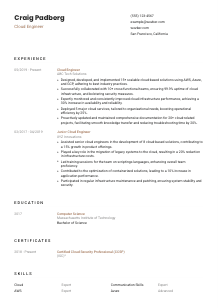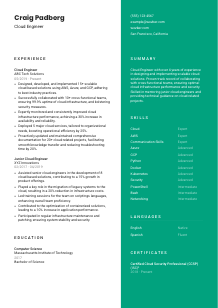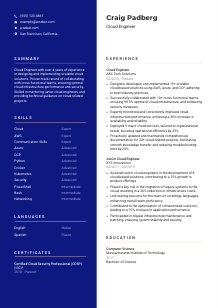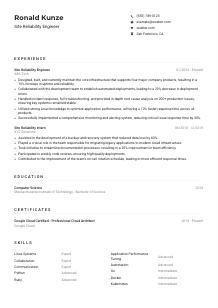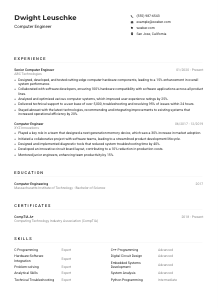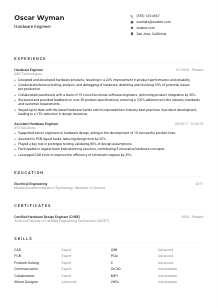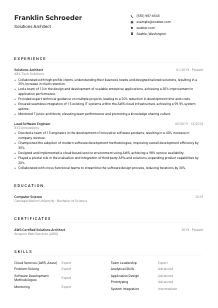Cloud Engineer Resume Example
Building atop the cloud but your resume feels foggy? Navigate this Cloud Engineer resume example, structured with Wozber free resume builder. Discover how to articulate your cloud expertise to sync with the job's dynamic demands, gearing your career higher and far from any data storms!
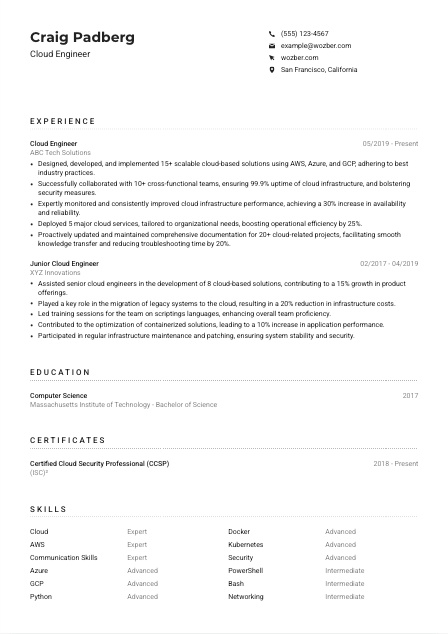
How to write a Cloud Engineer Resume?
Hello, aspiring Cloud Engineer! In the vast and evolving cloud technology space, standing out is not just a goal; it's a necessity. Your resume is more than a piece of paper—it's a gateway to your future career. With the help of Wozber, a free resume builder, this guide will navigate you through crafting a resume that resonates with your dream Cloud Engineer role, ensuring it's in perfect harmony with the job's requirements.
Ready to climb the clouds to your career zenith? Let's embark on this thrilling journey to craft a compelling narrative that will make hiring managers take notice!
Personal Details
The Personal Details section is your first handshake with potential employers. It's vital to tailor it specifically for the Cloud Engineer position. Let's see how you can align this section with the job's demands, making it not just accurate, but a compelling introduction.
1. Make Your Name Shine
Think of your name as your brand. Use a clean, professional font and size it slightly larger than the rest of the text to ensure it grabs attention.
2. Match Your Job Title
Directly under your name, include the job title you're targeting, "Cloud Engineer," to instantly signal to the hiring manager that you're a perfect fit for the role.
3. Craft Concise Contact Information
- Phone Number: Validation is key! Double-check that your number is typo-free.
- Professional Email Address: Opt for a simple, but professional format such as firstname.lastname@email.com.
4. Pinpoint Your Location
Mentioning "San Francisco, California" aligns with the job's location requirement. This assures prospective employers of your availability without the need for relocation.
5. Consider a Professional Profile
If relevant, include a link to your LinkedIn profile. Ensure it reflects your resume, creating a cohesive narrative of your professional journey.
Takeaway
Your Personal Details section is the cornerstone of your professional presentation. It's vital to keep it professional and aligned with the Cloud Engineer position you're eyeing. This is your business card within the resume – make it count!





Experience
The Experience section is where you shine a spotlight on your journey, showcasing why you're the cloud wizard that companies dream of. Here's how to tailor your experience for the Cloud Engineer position, proving your worth with each bullet point.
- Designed, developed, and implemented 15+ scalable cloud‑based solutions using AWS, Azure, and GCP, adhering to best industry practices.
- Successfully collaborated with 10+ cross‑functional teams, ensuring 99.9% uptime of cloud infrastructure, and bolstering security measures.
- Expertly monitored and consistently improved cloud infrastructure performance, achieving a 30% increase in availability and reliability.
- Deployed 5 major cloud services, tailored to organizational needs, boosting operational efficiency by 25%.
- Proactively updated and maintained comprehensive documentation for 20+ cloud‑related projects, facilitating smooth knowledge transfer and reducing troubleshooting time by 20%.
- Assisted senior cloud engineers in the development of 8 cloud‑based solutions, contributing to a 15% growth in product offerings.
- Played a key role in the migration of legacy systems to the cloud, resulting in a 20% reduction in infrastructure costs.
- Led training sessions for the team on scriptings languages, enhancing overall team proficiency.
- Contributed to the optimization of containerized solutions, leading to a 10% increase in application performance.
- Participated in regular infrastructure maintenance and patching, ensuring system stability and security.
1. Dissect the Job Requirements
Unpack each requirement in the job description. This rigorous examination will guide you in highlighting the most relevant aspects of your work history.
2. Structure Your History
Layout your experience in reverse chronological order. For each role, list your title, the company, and your tenure, creating a clear roadmap of your career.
3. Tailor Your Achievements
Detail achievements that mirror the job's needs, such as "Designed, developed, and implemented scalable cloud-based solutions using AWS, Azure, and GCP." This directly aligns with the responsibilities of the role you're pursuing.
4. Quantify Your Impact
Numbers speak louder than words. Whenever possible, quantify your achievements to provide a tangible measure of your contributions.
5. Relevance Is Key
Focus on experiences directly related to the job you're applying for. Diverging too much can dilute the impact of your truly relevant achievements.
Takeaway
Think of your Experience section as the main plot of your professional story. Each achievement is a chapter proving your capability and fit for the Cloud Engineer position. It's your chance to demonstrate that you're not just a candidate – you're the candidate.
Education
Your Education section is more than a list of degrees; it's proof of your solid foundation in the Cloud Engineering world. Learn how to sculpt this section to reflect your preparedness for the role's demands, elevating your qualifications.
1. Highlight the Right Degree
Identify the essential educational requirement from the job description, such as a "Bachelor's degree in Computer Science," and ensure your highest relevant degree is listed to mirror this requirement.
2. Simple yet Effective Structure
Maintain clarity with a straightforward structure: your degree, the field of study, followed by the institution's name and your graduation year.
3. Align Your Degree with the Job
In cases where you possess the specific degree mentioned, such as "Bachelor of Science in Computer Science," make sure it's highlighted to directly match the job criteria.
4. Mention Relevant Courses or Projects
While not always necessary, highlighting pertinent courses or significant projects can add depth, especially for entry-level positions or if your degree closely aligns with the job's focus.
5. Showcase Additional Achievements
Relevant educational accolades, clubs, or projects that demonstrate your engagement and prowess in your field can be included but weigh their relevance according to the level of the position.
Takeaway
Your Education section reinforces your foundations in the Cloud Engineering field. It assures employers of your academic prowess and readiness to tackle industry challenges. Let it reflect the depth of your knowledge and your commitment to the profession.
Certificates
In the ever-evolving field of cloud engineering, staying ahead with the latest certifications can set you apart. Here's how to select and present the certificates that underscore your expertise and continuous learning zeal.
1. Identify Relevant Certifications
Although the job description might not specify certifications, listing relevant ones, like "Certified Cloud Security Professional (CCSP)," demonstrates your commitment and specialized knowledge.
2. Curate with Purpose
Choose to list certifications that are directly beneficial to the Cloud Engineer role you're targeting. This amplifies your resume's appeal by showcasing your dedication to the field.
3. Date Your Achievements
For certifications, especially in tech, timelines matter. Include acquisition or expiration dates to show your knowledge is current and practical.
4. Seek Continuous Improvement
The tech field doesn't stand still, and neither should you. Regularly update your certifications and skill set to stay ahead of the curve.
Takeaway
Your certificates are badges of honor, showcasing your dedication to mastering your craft. They communicate to employers that you're not just qualified; you're constantly evolving with the field. Highlight them as jewels in your Cloud Engineer crown.
Skills
Skills are the tools in your Cloud Engineering toolbox. Let's dive into separating the must-haves from the nice-to-haves and organizing them in a way that resonates with the role you desire.
1. Extract Skills from the Job Description
Start by mapping out both explicit and implied skills mentioned in the job description, such as proficiency in AWS, GCP, or Azure, Docker and Kubernetes, and scripting languages like Python.
2. Prioritize the Must-Haves
Focus on listing skills that directly match the job description. Highlighting your expertise in cloud platforms and containerization technologies directly correlates with the role's needs.
3. Organize for Impact
List your skills in a logical, easily digestible format. Categorize them into 'Cloud Platforms,' 'Scripting Languages,' and 'Containerization Technologies' to showcase your comprehensive toolkit.
Takeaway
Your Skills section is a concise exhibit of your relevant expertise. Aligning it with the job's requirements is crucial, indicating to hiring managers that you're equipped with the right tools for the role. It's where you prove you can not just do the job—you can excel at it.
Languages
In the global cloud ecosystem, language skills can amplify your appeal. Find out how to smartly display linguistic capabilities to navigate multicultural teams and projects effortlessly.
1. Refer to the Job's Language Needs
Note the language requirements from the job posting. For this Cloud Engineer role, proficient English speaking skills are essential.
2. Prominently Feature Key Languages
Lead with your proficiency in required languages like English. This immediate alignment with job prerequisites speaks volumes of your qualifications.
3. List Secondary Languages
Even if not requested, your other language skills can be an asset. They showcase cultural adaptability and potential for cross-regional collaboration.
4. Be Honest with Your Proficiency Level
Clarity is key. Clearly indicate your level for each language, ensuring there are no misconceptions about your fluency.
5. Contextualize Your Language Skills
Understand and articulate how your language skills can benefit the team and the projects you'd be working on, especially in roles requiring communication with global clients or team members.
Takeaway
Your language skills are a testament to your ability to navigate the global cloud landscape. While English may be a requirement, every additional language you speak opens up more avenues for collaboration, innovation, and success.
Summary
The Summary section of your resume is your chance to hook the hiring manager with a concentrated dose of your professional essence. Let's carefully craft a summary that squashes any doubts about your suitability for the Cloud Engineer role.
1. Capture the Job's Core
Digest the job's requirements and reflect on how your experience and skills fulfill these needs. Right from the start, you want to establish a strong match.
2. Lead with Your Strengths
Begin with a statement that encapsulates who you are in the professional realm, focusing on your cloud engineering expertise and accomplishments.
3. Showcase Relevant Achievements
Select a few key achievements that directly address the role's needs. Highlighting impactful projects you've led or innovations you've driven can be compelling evidence of your capabilities.
4. Keep It Snappy
Aim for a succinct yet powerful summary. Your goal is to entice hiring managers to delve deeper into your resume, so make every word count.
Takeaway
The Summary section is your opportunity to make a memorable first impression. It encapsulates your professional identity and whets the hiring manager's appetite for more. Let your summary resonate with confidence and capability, setting the tone for the rest of your resume.
Launching Your Cloud Engineer Odyssey
Congratulations on completing this detailed guide! Armed with these insights, you're equipped to create a Cloud Engineer resume that doesn't just pass an ATS check but captivates the human behind the tech. Your resume is your narrative. Use Wozber, the free resume builder, to ensure it's ATS-compliant, polished, and ultimately, reflective of your unique professional story.
The cloud realm awaits your skill and passion. Chart your course with confidence and let your resume be the key to unlocking new career heights.

- Bachelor's degree in Computer Science, Information Technology, or a related field.
- Minimum of 3 years of experience in Cloud platform administration, specifically with AWS, Azure or GCP.
- Proficiency in scriptings languages such as Python, PowerShell, or Bash.
- Solid understanding of containerization technologies, preferably with experience in Docker and Kubernetes.
- Excellent interpersonal and communication skills to collaborate with diverse teams and stakeholders.
- The role requires proficient English speaking skills.
- Must be located in San Francisco, CA.
- Design, develop, and implement scalable cloud-based solutions using industry best practices.
- Collaborate with cross-functional teams to ensure optimal cloud infrastructure performance and security.
- Monitor and troubleshoot cloud infrastructure to ensure high availability and reliability.
- Deploy cloud services to meet organizational needs and provide technical guidance on cloud-related projects.
- Regularly update and maintain documentation related to cloud architecture and processes.





